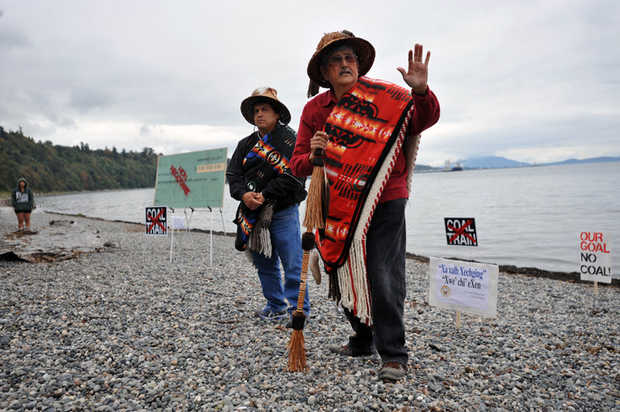
BY RALPH SCHWARTZ, The Bellingham Herald
Lummi Nation sent a letter on Monday, Jan. 5, to the U.S. Army Corps of Engineers, asking the agency to immediately reject a permit application for a coal terminal at Cherry Point because it would interfere with tribal fishing grounds.
An environmental group in Bellingham called the action “historic.”
Lummi Nation cited its rights under a treaty with the United States to fish in its “usual and accustomed” areas, which include the waters around Cherry Point. A court decision in 2000 clarified the Lummi fishing territory, first established in 1855, to include northern Puget Sound from the Fraser River to Seattle, with the exception of the Strait of Juan de Fuca and Hood Canal.
“The Lummi have harvested at this location since time immemorial and plan to continue into the future,” said the Lummi letter, signed by Chairman Tim Ballew. “The proposed project will impact this significant treaty harvesting location and will significantly limit the ability of tribal members to exercise their treaty rights.”
The letter was authorized by the Lummi Indian Business Council on Wednesday, Dec. 31.
A manager at RE Sources for Sustainable Communities in Bellingham said in a message to members that the Lummis had made “an historic announcement.”
“This is a critical development in the fight to block the Cherry Point coal terminal,” wrote Matt Petryni, clean energy program manager at RE Sources.
Past case law suggests Gateway Pacific Terminal could be in trouble. The corps rejected a permit in 1992 for a salmon farm in Rosario Strait on the grounds that the farm, though no larger on the surface than 1.41 acres, would interfere with Lummi fishing. The decision withstood a challenge in U.S. District Court.
“There’s a precedent for a threshold of impact on treaty rights,” Ballew said. “I trust that the Corps will uphold its constitutional responsibility.”
Officials for Gateway Pacific Terminal said they could not comment before the deadline for this story.
The coal terminal, if approved by federal and state agencies, and Whatcom County, would ship up to 48 million metric tons of coal annually to Asian ports, starting as early as 2019.
While environmentalists who have actively opposed the coal terminal for years celebrated, they didn’t declare victory.
“One of the things I’m sure of is that the Corps will respond to the gravity of this statement,” said Crina Hoyer, RE Sources’ executive director. “What the ultimate end result will be, it may be decided in the court.”
Corps officials said they will review the 97-page document submitted to them on Monday by the tribe. If the Corps finds that treaty-protected fishing would be disrupted to any significant degree, it will pass the information along to project applicant SSA Marine of Seattle for review.
“We generally ask the applicant to coordinate with the relevant tribes and to resolve the issue,” the Corps said in a statement on Monday.
Lummi Nation consistently has opposed the coal terminal publicly. Tribal members in 2012 burned a symbolic check representing a presumed buy-out from the coal industry. Last year, the tribe toured the western U.S. and Canada with a totem pole to raise awareness of their opposition to fossil-fuel transport. The tribe also has criticized Gateway Pacific Terminal in written comments to permitting agencies.
“This is the strongest statement that we’ve seen from the Lummi Nation,” Hoyer said.
A report released last month provided preliminary evidence that the terminal would impede tribal fishing. The vessel traffic study, developed by SSA Marine and Lummi Nation with oversight by the state Department of Ecology, indicated that cargo ships and other traffic for Gateway Pacific Terminal would increase the number of vessels in north Puget Sound by 15 percent. Vessel traffic in the vicinity of Cherry Point would increase 33 percent. The risk of oil spills also would increase.
Those results, released on Dec. 18, were not taken to be final. Ecology officials emphasized that further study of vessel traffic would be included in a draft of the environmental impact statement on the coal terminal, expected in early 2016.
Even so, the Lummis mentioned the vessel traffic study in their letter to the Corps.
“Review of the impacts associated with this project, including … (the vessel traffic study) lead to the inescapable conclusion that the proposed project will directly result in the substantial impairment of the treaty rights of the Lummi Nation,” the letter said.
